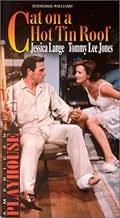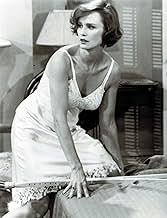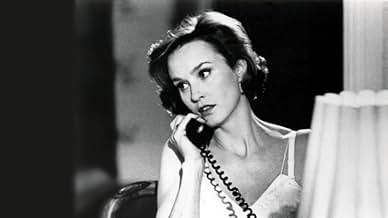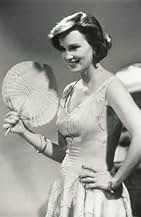AVALIAÇÃO DA IMDb
6,7/10
625
SUA AVALIAÇÃO
Adicionar um enredo no seu idiomaAn alcoholic and femme fatale face troubles before a family reunion.An alcoholic and femme fatale face troubles before a family reunion.An alcoholic and femme fatale face troubles before a family reunion.
- Ganhou 1 Primetime Emmy
- 1 vitória e 7 indicações no total
Avaliações em destaque
Have enormously fond memories of reading and studying 'Cat on a Hot Tin Roof' in school and have held it in very fine regard since. Consider Tennessee Williams one of the all-time great American playwrights, one of my favourites overall actually, and 'Cat on a Hot Tin Roof' is one of his best and most justifiably famous. It was also apparently Williams' personal favourite of his plays, not hard to see why either, and there is a lot of great ones to choose from.
Personally love the 1958 film in its own way, there is to me a lot to love about it on its own terms. Especially the acting, have yet to come across a better Big Daddy than Burl Ives, who originated the role, and it is both entertaining and powerful. It really is best judging it as a standalone though, because it is toned down from the play, the innuendos being muted, the ahead of the time themes not as daring and omissions due to censorship. On the adaptation front, this television version is much more faithful and satisfying and doesn't have the limitations of censorship, so what was omitted is here and what was muted had full impact. Also consider it the better version overall.
This 'Cat on a Hot Tin Roof' may not have the more expansive budget or more lavish production values of a film, if there was one thing that the 1958 film is superior in it is the production values, but it still looks good and has a sense of time and place. The photography has a filmed play look, yet that wasn't a problem for me, am used to that as someone who watches opera, play and ballet productions on a regular basis. It wasn't chaotic or static at least. Liked the sultriness of the music too.
Williams' dialogue absolutely sizzles and the story never fails to be so emotionally powerful. The stage direction does nothing to diminish the power of the dialogue and story, showing throughout respect for Williams' intent. With the exception of the cat-like movements with the hands, that was not needed. The character interaction is every bit as sizzling as the script, electrifying especially between Brick and Big Daddy in primarily their Act 2 confrontation (a masterclass of acting). Other than that scene, there was another that stuck with me, Big Mamma's reaction to the truth behind Big Daddy's cancer diagnosis, goodness wasn't that heart-rending or what.
One cannot not talk about a production for anything without making any mention of the cast. Absolutely loved the performances here, all of them, and to me the accents sounded spot on (have heard far more exaggerated "southern accents"). Jessica Lange is a sultry and deeply felt Maggie, and Tommy Lee Jones gives a compelling tortured turn as Brick, one of Williams' most difficult roles.
Rip Torn (rest in peace) is on towering form as Big Daddy, full of authority but also soul, and there has never been a more definitive or more human Big Mamma than that of Kim Stanley.
In summary, a fine production of a masterpiece. 9/10
Personally love the 1958 film in its own way, there is to me a lot to love about it on its own terms. Especially the acting, have yet to come across a better Big Daddy than Burl Ives, who originated the role, and it is both entertaining and powerful. It really is best judging it as a standalone though, because it is toned down from the play, the innuendos being muted, the ahead of the time themes not as daring and omissions due to censorship. On the adaptation front, this television version is much more faithful and satisfying and doesn't have the limitations of censorship, so what was omitted is here and what was muted had full impact. Also consider it the better version overall.
This 'Cat on a Hot Tin Roof' may not have the more expansive budget or more lavish production values of a film, if there was one thing that the 1958 film is superior in it is the production values, but it still looks good and has a sense of time and place. The photography has a filmed play look, yet that wasn't a problem for me, am used to that as someone who watches opera, play and ballet productions on a regular basis. It wasn't chaotic or static at least. Liked the sultriness of the music too.
Williams' dialogue absolutely sizzles and the story never fails to be so emotionally powerful. The stage direction does nothing to diminish the power of the dialogue and story, showing throughout respect for Williams' intent. With the exception of the cat-like movements with the hands, that was not needed. The character interaction is every bit as sizzling as the script, electrifying especially between Brick and Big Daddy in primarily their Act 2 confrontation (a masterclass of acting). Other than that scene, there was another that stuck with me, Big Mamma's reaction to the truth behind Big Daddy's cancer diagnosis, goodness wasn't that heart-rending or what.
One cannot not talk about a production for anything without making any mention of the cast. Absolutely loved the performances here, all of them, and to me the accents sounded spot on (have heard far more exaggerated "southern accents"). Jessica Lange is a sultry and deeply felt Maggie, and Tommy Lee Jones gives a compelling tortured turn as Brick, one of Williams' most difficult roles.
Rip Torn (rest in peace) is on towering form as Big Daddy, full of authority but also soul, and there has never been a more definitive or more human Big Mamma than that of Kim Stanley.
In summary, a fine production of a masterpiece. 9/10
Don't throw anything at me, but I think the 1984 version of Cat on a Hot Tin Roof is better than the 1958 original. Without the constraints of the Production Code, this live televised version was able to showcase Tennessee Williams's story as he wrote it. When Paul Newman skulked around mourning his pal, we just didn't understand why. With Tommy Lee Jones, we see his pain, conflict, and shame - and we're told why. In case you're unfamiliar with the story, I won't spoil it for you.
Jessica Lange is lovely as Maggie the Cat, a sensual and frustrated lady who can't understand why her husband would rather mope around than sleep with her. He has a broken leg; what else does he have to do around the house? As she and Tommy Lee spar off each other, you know you're in the presence of professionals. These are serious actors who can make the best of a very simple story. Of Williams's plays, this is not my favorite. But with Jessica, Tommy Lee, and Rip Torn as Big Daddy, this is as good as Cat on a Hot Tin Roof will get. Sometimes filmed plays feel a little stage-y, but this one is very good. The only thing stage-y about it is Williams's script, and the actors are not at fault.
Jessica Lange is lovely as Maggie the Cat, a sensual and frustrated lady who can't understand why her husband would rather mope around than sleep with her. He has a broken leg; what else does he have to do around the house? As she and Tommy Lee spar off each other, you know you're in the presence of professionals. These are serious actors who can make the best of a very simple story. Of Williams's plays, this is not my favorite. But with Jessica, Tommy Lee, and Rip Torn as Big Daddy, this is as good as Cat on a Hot Tin Roof will get. Sometimes filmed plays feel a little stage-y, but this one is very good. The only thing stage-y about it is Williams's script, and the actors are not at fault.
I have an extraordinary attachment to this play. Aside from being my all-time favorite, which I have read at least fifty times, I was also cast as Big Daddy for an attempted high school production, which, fittingly enough for the history of the play, I suppose, was cancelled and replaced with something "more appropriate" under pressure from the school's administration. I saw the original Newman-Taylor version after reading it the first few times, but had heard a lot of raving that the 1958 film was horrible and that this was worlds better. I found a laser-disc copy and watched it this afternoon. I definitely have more complaints with this performance than I expected. I personally wish that the Rip Torn of 'The Insider' and 'Wonder Boys' had been present in the role of Big Daddy, rather than the version I saw, who despite playing the role with an enormous passion, produced a performance which saw his accent slide all over the place, from a few moments of European immigrant on one misguided extreme to Chris Kattan's incomprehensible sketches on SNL at another, the original lines by Tennessee Williams often escape him, and overall, it results in a very streaky and inconsistent characterization. Perhaps this is a result of being filmed live, or perhaps it's a Rip Torn without an additional fifteen years of experience. Jessica Lange also turned in an impassioned role, but she also seemed rather inconsistent. I actually longed for a little of Liz Taylor's cattiness in the first act, but the play as a whole I preferred Lange. My only quibble with Tommy Lee Jones was that he did not seem to make a decision whether Brick was indeed homosexual or not, which I think is important, because the issue of homosexuality, although the most controversial aspect, is not so crucial to the play as the issues of mendacity dissolving his friendship with Skipper. The two are interrelated, but while the belief that Skipper was homosexual would cause him to question his own sexuality, there were times when Jones seemed to actually believe the allegations, moreso than I would have expected from the character. Gooper, Mae, and Big Mama all were the finest I've seen those roles played. The other complaint was with some of the production values. I was glad that it was done realistically rather than expressionistically as Kazan first directed it on Broadway, but the liquor cabinet and bed are supposed to both have an awesome presence on the room, and neither does in this film, nor does the bedroom have the quality of "pale light on weathered wood" Williams specified in the production notes. Also, Big Daddy's entrance in a baseball cap seemed entirely out of place. Worst, however, was the soft-focus quality of the camera. There are some questionable directorial decisions, things I think could have been staged better, but the essence of the play shines through, and most importantly, the third act is nearly flawless. The passionate conflicts that Williams weaves together are communicated, and the play is so good that nearly any group, probably even my little high school troupe, could have moved an audience, even if not displaying master craft.
Tennesee Williams is, without a doubt, one of the best writers of the 20th century. Cat on a Hot Tin Roof has always been my personal favorite. This particular version first came out as part of a project that premium cable (Showtime I think) was doing in its early years. If I'm not mistaken, the performance was taped live in an effort to create a live theatrical atmosphere. I bring this up because it will explain to those who care why it looks so much like a soap opera, only with good writing.
Aside from the somewhat cheesy production level, this is one of the best adaptations I have ever seen of a play to television. It couldn't be better cast. The performances are excellent. Even the DX-7ish sounding music score has a sultry feel to it that matches the setting beautifully.
My first experience with this play was, like many I suppose, the film version with Paul Newman, Elizabeth Taylor, and Burl Ives. Even in that watered down version, the play had power, so I went to rent it to check it out more thoroughly. The video store had this version of it instead. When it first played on TV, I was much too young to really appreciate the power and raw emotion of the story in its pure form. I never would have guessed the movie was so bad. Burl Ives, after all, played Big Daddy in the original production. Unfortunately, the people who made the movie were apparently either too scared or too hampered by censorship concerns and star egos to present a workable facsimile of the original. I can understand axing the ambiguously homosexual relationship that has cast Brick into his alcoholic nose dive, I suppose, though the story loses almost all of its power because of it. I cannot, however, understand giving Big Mama's only sympathetic line in the whole play over to Elizabeth Taylor, who now strikes me as badly miscast in the role.
I should point out, however, that even this version is not exactly what Williams wrote. In this case, though, that is to its benefit. Williams' original version did not have Big Daddy in the final scenes. The original director, Elia Kazan, wanted him back, so Williams, since he liked the character anyway, obliged him. The scene as rewritten, however, never struck me as quite as good as Williams' original effort. This version has taken the best of both of those versions, a few nicely written lines that were added to the movie version and melded them into a superb synthesis whose presentation is most assuredly greater than the sum of its parts. I hate hearing this play end any way other than Maggie telling Brick she loves him, and Brick replying, "Wouldn't it be funny if that was true?"
All in all, this was a magnificent effort. I only regret that premium cable did not keep up the good work.
Aside from the somewhat cheesy production level, this is one of the best adaptations I have ever seen of a play to television. It couldn't be better cast. The performances are excellent. Even the DX-7ish sounding music score has a sultry feel to it that matches the setting beautifully.
My first experience with this play was, like many I suppose, the film version with Paul Newman, Elizabeth Taylor, and Burl Ives. Even in that watered down version, the play had power, so I went to rent it to check it out more thoroughly. The video store had this version of it instead. When it first played on TV, I was much too young to really appreciate the power and raw emotion of the story in its pure form. I never would have guessed the movie was so bad. Burl Ives, after all, played Big Daddy in the original production. Unfortunately, the people who made the movie were apparently either too scared or too hampered by censorship concerns and star egos to present a workable facsimile of the original. I can understand axing the ambiguously homosexual relationship that has cast Brick into his alcoholic nose dive, I suppose, though the story loses almost all of its power because of it. I cannot, however, understand giving Big Mama's only sympathetic line in the whole play over to Elizabeth Taylor, who now strikes me as badly miscast in the role.
I should point out, however, that even this version is not exactly what Williams wrote. In this case, though, that is to its benefit. Williams' original version did not have Big Daddy in the final scenes. The original director, Elia Kazan, wanted him back, so Williams, since he liked the character anyway, obliged him. The scene as rewritten, however, never struck me as quite as good as Williams' original effort. This version has taken the best of both of those versions, a few nicely written lines that were added to the movie version and melded them into a superb synthesis whose presentation is most assuredly greater than the sum of its parts. I hate hearing this play end any way other than Maggie telling Brick she loves him, and Brick replying, "Wouldn't it be funny if that was true?"
All in all, this was a magnificent effort. I only regret that premium cable did not keep up the good work.
While I haven't seen very much of the highly-touted 1958 film version of Tennessee Williams's play Cat on a Hot Tin Roof with Paul Newman and Elizabeth Taylor (arguably the most attractive stars of their respective times), the film itself from what I've read was censored and given a tacked on ending to appease the Hayes Code and Catholic League of Decency. I'd imagine the actors were cast well for the parts, but it would likely be best to have the full power and conviction and very human tragedy of Brick to be most effective. Since then the play has been produced countless times in all parts of the country (not least of which on Broadway, where as recent as the past few years an all-black cast was put together for a revival), and as with this 1985 live-taped show, some of it was broadcast as it was for the masses.
I saw the a video of this production, featuring Tommy Lee Jones, Jessica Lange, and Rip Torn, in a Modern Drama class at my old college, and it definitely left an impact after already going over the play in heavy lit-analysis mode. It is, of course, hampered by being a filmed taping of a live performance, but in this limitation it's great to just watch the actors fully embody these characters on their own terms. And, more often than not, it's dynamite; it might even be some of the best acting Torn has ever done, on stage or in film, as the tough "Big Daddy" character who gets a big powerhouse act to spar off of Jones in his conflicted, repressed homosexual character grieving his friend's suicide. Lange, by the way, is excellent in her sultry but depressed wife who is ignored/belittled by Brick.
So, as I can't really give a base of comparison between original film version and this, I can simply say that, for what it's worth, it gives fans of Williams and the play itself their money's worth (or TV-viewing time worth, if it happens to ever play again on a channel). Find it on video if you can!
I saw the a video of this production, featuring Tommy Lee Jones, Jessica Lange, and Rip Torn, in a Modern Drama class at my old college, and it definitely left an impact after already going over the play in heavy lit-analysis mode. It is, of course, hampered by being a filmed taping of a live performance, but in this limitation it's great to just watch the actors fully embody these characters on their own terms. And, more often than not, it's dynamite; it might even be some of the best acting Torn has ever done, on stage or in film, as the tough "Big Daddy" character who gets a big powerhouse act to spar off of Jones in his conflicted, repressed homosexual character grieving his friend's suicide. Lange, by the way, is excellent in her sultry but depressed wife who is ignored/belittled by Brick.
So, as I can't really give a base of comparison between original film version and this, I can simply say that, for what it's worth, it gives fans of Williams and the play itself their money's worth (or TV-viewing time worth, if it happens to ever play again on a channel). Find it on video if you can!
Você sabia?
- CuriosidadesThe original play "Cat On A Hot Tin Roof" by Tennessee Williams opened at the Morosco Theater in New York on March 24, 1955, ran for 694 performances and was nominated for the 1956 Tony Award (New York City) for the Best Play. The play also won the Pulitzer Prize in Drama in 1955.
- Erros de gravaçãoShadow of boom mic is seen on Brick.
- ConexõesEdited into American Playhouse: Cat on a Hot Tin Roof (1985)
Principais escolhas
Faça login para avaliar e ver a lista de recomendações personalizadas
Detalhes
- Data de lançamento
- País de origem
- Idioma
- Também conhecido como
- American Playhouse: Cat on a Hot Tin Roof
- Empresas de produção
- Consulte mais créditos da empresa na IMDbPro
Contribua para esta página
Sugerir uma alteração ou adicionar conteúdo ausente

Principal brecha
By what name was Cat on a Hot Tin Roof (1984) officially released in Canada in English?
Responda





























